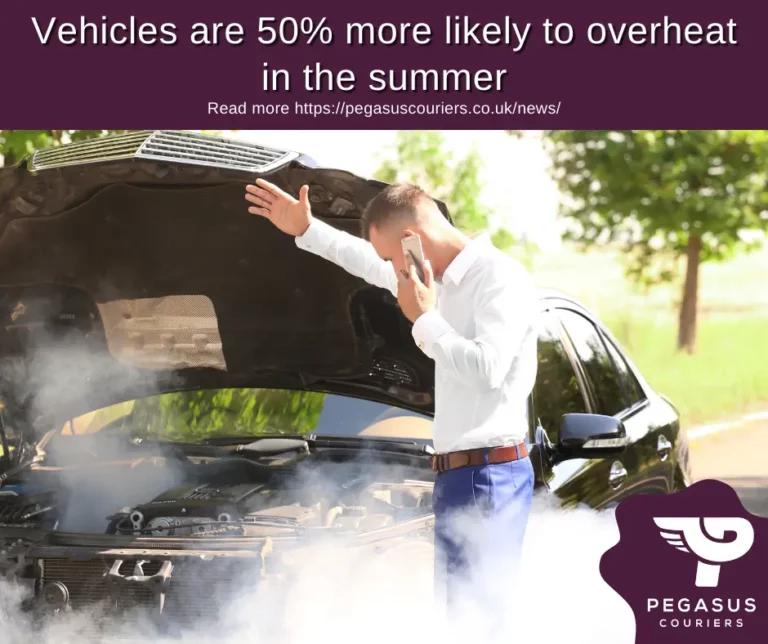UK Summer: Avoid a Vehicle Breakdown

Martin Smith
Pegasus Couriers MD

Summer is here! That means it’s time to hit the open road. But before you hit the motorway, it’s important to take some time to prepare for the summer driving season. Here Pegasus Couriers MD Martin Smith gives some tips to help you avoid a vehicle breakdown.
Prevent a Summer Breakdown
In the midst of the summer’s sizzling heat, driving can become a challenging task. It’s the season when most people decide to hit the road for vacations or weekend getaways, increasing the likelihood of vehicle issues. Being in the courier industry, the increase in summer traffic is noticeable as it also impacts delivery times.
Did you know vehicles are 11% more likely to lose power – due to battery issues – in the summer?
Understanding likely problems and taking the needed precautions can help avoid unexpected mishaps. Here I want to provide insights on preventing common summer breakdowns.

A Basic Checklist:
After some research, I developed a short checklist that could help prevent summer breakdowns.
Vehicle Battery:
The RAC said vehicle battery issues are the main offender of summer breakdowns.
Vehicle batteries often face a demanding time in both winter and summer. The number of short trips, increased stop-start activity, and a load of numerous gadgets can lead to battery exhaustion. If your vehicle experiences slow starting or dimmed lights, these could be signs of a depleting battery.
For batteries nearing their fourth or fifth year, it’s advisable to consider replacing them before embarking on a long journey.
Overheating and Fluids:
According to insurance company AXA, vehicles are 50% more likely to overheat in the summer. Check your coolant levels to keep your engine cool in the summer. Interestingly, 31% of vehicles are more likely to have gearbox problems in summer. To prevent this, check the transmission oil.
Make sure your vehicle also has brake fluid. Read the owner’s manual for your vehicle’s correct levels.
Inspect Tyres
As mentioned earlier this month, ensuring your tyres are correctly inflated and have good tread is critical.
Be prepared
It is always a good idea to pack a small first-aid kit, water and snack bars. I also recommend keeping a mobile charging cord in the vehicle if you need to charge your mobile during a breakdown.
Punctures and a Spare Tyre
A tyre puncture can be a road-trip worst nightmare. The risk increases during summer travels, especially with more passengers and luggage. If the vehicle has no spare tyre, get a repair kit as a backup. Please familiarise yourself with the repair kit and how to use it. Remember that a repair kit will not suffice for severe punctures, and a spare tyre will be necessary.
I also advise that you save your breakdown services emergency contact number on your mobile – that makes it less stressful to try to find contact numbers during a breakdown.
Alternator Anomalies
Alternator issues are linked to battery problems. High demand for the alternator, coupled with hot weather, can expose any weaknesses. If your vehicle’s red battery warning light flickers on the dashboard, stop the vehicle. Alternator replacements can be costly, so detecting and addressing issues earlier is better and safer.
Clutch Complications
Vehicles see increased use in engaging with the clutch – largely due to summer traffic. Unfamiliar terrains and towing trailers can add to the strain on your clutch. Warning signs of a worn clutch include:
- A heavy or gritty pedal.
- High clutch bite.
- Slipping when accelerating in a high gear at low speed.
Not All Changes are Problems
The heat can bring about specific changes in your vehicle’s behaviour. However, not all of these are cause for concern:
- Pools of Water: Condensed water from the air conditioning system can puddle under your vehicle.
- Smoke from Air Vents: Unless the smoke is acrid, it’s usually water vapour from the air conditioning unit.
- Roaring from the Engine Bay: This is typically the cooling fan turning on and off.
- Less power: vehicles can seem more sluggish in summer due to warmer, less dense air.
Not All Changes are Problems
Remember ‘FORCES’ for a quick vehicle check:
- Fuel: Ensure your vehicle has enough fuel for the journey.
- Oil: Regularly check your oil level to prevent engine damage and overheating.
- Rubber: Check your tyres for uneven wear and ensure wiper blades are in good condition.
- Coolant: Monitor coolant levels to maintain the right engine temperature.
- Electrics: Ensure your vehicle’s electrics, including wipers, lights, indicators, and windows, function correctly.
- Screenwash: Keep your windscreen washer fluid topped up to ensure clear visibility.
Summer Fun
Summer brings its share of challenges for all drivers. With a bit of preparation, motorists can ensure an enjoyable and safer journey. Regular vehicle checks, understanding your vehicle’s behaviour, cautious driving, and appropriate breakdown cover can prevent unforeseen hiccups.
We always discuss issues and possible breakdown protocols with our drivers. The Pegasus Couriers Driver Intranet lists all the breakdown and insurance providers our drivers need. This ensures all the much-needed emergency contacts are at their fingertips.
Interested?
If you want more information, read how Courier Drivers use technology to save time, how road safety can save lives, what to do if you fill up with the wrong fuel, typical delivery driver Q&A and much more.
If you want to become a driver or need more information, apply online, and we will call you back.

The Future of the Courier Industry
The courier industry is vital to the global economy, transporting goods to consumers worldwide.

Do couriers know what is inside the parcel?
Courier drivers are responsible for delivering parcels, but do they know what they are delivering?

Should Stealth Vans and Drones be Used for Road Safety?
Using stealth vans and drones to monitor roads is a controversial issue.